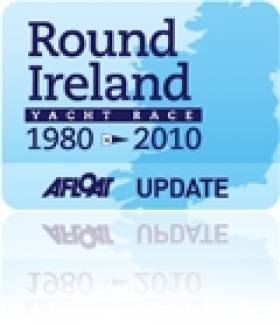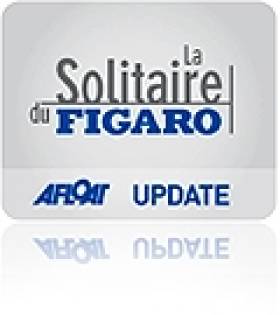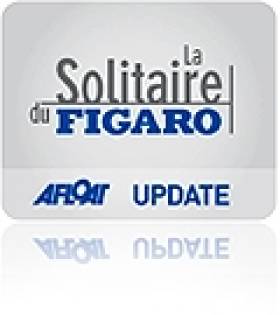Displaying items by tag: Mick Liddy
National Yacht Club Hosts Offshore Sailing Talk
Sailing offshore? The National Yacht Club is staging an 'Introduction to Offshore Racing' evening next Saturday 7th April 2011 at 19.30 and a line up of speakers inlcudes Maurice 'Prof' O’Connell on winning the 2009 Dun Laoghaire to Dingle Race. Mick Liddy on how to prepare for offshore sailing. Former National Yacht Club commodore Peter Ryan will give tips on ISORA racing in the Irish Sea.
Whether you are a Round Ireland expert or an offshore newbie the Dun Laoghaire club stresses it is an informal night but a 'unique one' both for offshore sailing fans and those who might be considering going offshore for the first time this season.
All the latest ISORA News
All the latest ICRA News
All the latest La Solitaire du Figaro News
All the latest Round Ireland News
Before the race got on the water, the scene was set onshore with a storyboard lifted from Galway '09. In a bid to mirror the Volvo Ocean Race stop-over, the Round Ireland was smartly enmeshed with a successful town festival in Wicklow, drawing in thousands of non-sailing civilians, many of whom hung out on the cliffs to watch one of the best-attended starts in years.
The backbone for this year's story was Tonnerre de Breskens III, owned by Dutchman Piet Vroon. The crew arrived in Wicklow with a brace of RORC victories, leading RORC's offshore table, and went into the race as favourites. The first twist in Tonnerre's plot came before the starter's gun, when Vroon ended up in hospital, from where he would follow the race as his crew sailed on without him. However, that would be the only bump in their road. Tonnerre led from start to finish, both on the water and on handicap. Vroon's crew brought home the trophy for their ailing skipper in the race's happy ending.
There was drama in their wake, though. Not the high-octane 60-knot knock-down drama of 2008, but good stuff nonetheless. Bernard Guoy's Inis Mor chased hard to no avail, and in the end they just couldn't do it. Theirs was the story of the weary, the plucky but the ultimately unlucky. In 2008 gear failure put them out of the running, but in 2010 it was Tonnerre's sheer perfection that relegated Inis Mor to the runner-up spot. You would be hard pressed to find an error in their race, and they deserved the second slot.There were other big guns, of course. Mick Liddy and Mark Pollock's Daft.com Class 40 was a drama mini-series all of its own, with a blind co-skipper in a high-powered double-hander seeming a deluded concept to many. Until the batteries died they were churning out their own stories, uploading video content to beat the band. Of course, directorial priorities shifted when their electrics went as they headed up the west coast. Pollock's input was limited to nearly nil without electronics, meaning Liddy became all but a solo sailor without relief, helming non-stop for four days. Their initially promising position was eroded in the last third of the race as fatigue bit hard.
No similar excuses for the biggest boat in the race, the Open 60 Spirit of Rosslare Europort, which by all accounts should have made hay in some heavier airs off the west coast and come home first for line honours. However, they couldn't capitalise on that. Some will say that Tonnerre was better suited to the conditions than the larger Open 60, while others will dismiss that as folly.
The dogfights, then, the meat-and-veg of the story, were in IRC 1. Visit Malta Puma, another hot contender from the Solent, was in charge for much of the race while things were quietly making their way up the west coast. In the Round Ireland, as in Irish history, things have a way of kicking off around the north-east corner. As the tides and light airs played with the fleet, the lead changed hands six times between Inistrahull and the finish, with Fujitsu and Visit Malta Puma match-racing down the Irish Sea, and Bejaysus and Aquelina doing the same behind them.
Visit Malta Puma would emerge victorious, and in the meantime, the leaders of Class 2 and the double-handers were passing the mouth of Strangford Lough and crossing Dundrum Bay. Psipina and Dinah would trade tacks all the way to Wicklow, with Paddy Cronin in Psipina (joined by John Loden) making it two in a row in the two-handers overall. Second place, however, would go to one of the backmarkers.
Theirs was the rags-to-riches tale of this Round Ireland. Brians Flahive and Byrne took a boat all but written off and kitted it out for the 704-mile offshore. Noonan Boat Oystercatcher was the racing equivalent of a transplant patient, with a large portion of its port side removed and rebuilt by its owner, boatbuilder Graham Noonan, also Flahive's boss. Ten days before the race, the pair were rigging the tiny Gibsea with a spinnaker for the first time, and as the front of the fleet slowed, they rocketed on into second, not bad for a major offshore debut.
And while champagne corks were popping on land, there were still cups of tea being handed up to the rail from many galleys along the Irish Sea coast. The finish to the Round Ireland was prolonged, but deciding the results was not as strung out an affair as years gone by, the winner having been decided well in advance of the last finishers' arrival.
The question mark at the end of this story leaves things open for an innovative sequel. Dropped into the narrative mid-race were questions in the national media over how more racers might be tempted to Wicklow for 2012. The festival was, no doubt, a good start, but what of the date? Would moving it away from the annual date of the 1700-boat Solent carnival that is the Round the Island, putting further distance between it and Cork Week make sense? Would it make for a greater foreign entry? Eight of the 36 entries this year were from outside of Ireland - who's to say that couldn't be doubled or tripled?
That's a script yet to be written. For Round Ireland 2010, the credits are rolling. Wicklow SC can be proud that they delivered yet another successful edition of Ireland's classic offshore, and the various actors can take a deserved bow for playing their part in another home-produced oceanic drama.
Round Ireland Yacht Race 2010 Trophy Winners
Line Honours - Denis Doyle Trophy
Tonnerre de Breskens 3 - Piet Vroon
IRC Overall - Norman Barry Trophy
Tonnerre de Breskens 3 - Piet Vroon
Inis Mor - Bernard Gouy
Visit Malta Puma - Philippe Falle
Class 7 / Two Handed - The Noonan Trophy
Psipsina - John Loden & Paddy Cronin
Noonan Boats Oystercatcher - Brian Flahive
& Bryan Byrne
Alchimiste - Michael Murphy & Alex Voye
Class Super 0
Spirit of Rosslare Europort - Alan McGettigan
Class 0 - Mew Island Trophy
Tonnerre de Breskens 3 - Piet Vroon
Inis Mor - Bernard Gouy
Pride of Wicklow - James Gair/David O'Gorman
Class 1 - Tuskar Cup
Visit Malta Puma - Philippe Falle
Fujitsu - Andrew Britton
Aquelina - James Tyrrell
Class 2 - Fastnet Cup
Raging Bull - Matt Davis
Psipsina - John Loden & Paddy Cronin
Dinah - Barry Hurley & Hannah White
Class 3 - Skelligs Cup
Noonan Boats Oystercatcher -
Brian Flahive & Bryan Byrne
Alchimiste - Michael Murphy & Alex Voye
Cavatina - Ian Hickey/Eric Lisson
Class 4 - Tory Island Trophy
Noonan Boats Oystercatcher -
Brian Flahive & Bryan Byrne
Cavatina - Ian Hickey/Eric Lisson
Gumdrop - Derek Gilmore
Class 5 / Classic - Michael Jones Trophy
Cavatina - Ian Hickey/Eric Lisson
Class 6 / Sigma 38 - Larry Ryan Trophy
Persistance - Jerry Collins
ISORA Trophy
Raging Bull - Matt Davis
Irish Cruiser Racing Association -
Round Ireland Trophy
Aquelina - James Tyrrell
Team Kinsale Yacht Club Trophy
Team 'RORC': Tonnerre de Breskens 3 - Piet Vroon / Visit Malta Puma - Philippe Falle / Psipsina - John Loden & Paddy Cronin Team 'Go Hard or Go Home': Pride of Wicklow - James Gair/David O'Gorman / Aquelina - James Tyrrell / Noonan Boats Oystercatcher - Brian Flahive & Bryan Byrne
More on the Round Ireland Yacht Race:
Round Ireland Yacht Race 2010 Review
Round Ireland Yacht Race, Ireland's top offshore fixture
A Round up of 80 stories on the 2010 Round Ireland Yacht RaceTwo Irish Skippers among 71 for La Solitaire du Figaro 2011
Two Irish skippers are among the 71 'pre-entries', including 24 rookies, for the La Solitaire du Figaro race.
Paul O'Riain and Mick Liddy, both from Dublin, will race back into their home port on the only foreign leg of the race course when it calls her in this August.
An increasing number of non-French sailors and some big names in offshore racing, the Figaro, promises to deliver exceptional racing for the 42nd edition of the race over the 1,695 mile-course.
The return of past winners
Confident with last year's victory, including three out of four leg wins, Armel Le Cléac'h returns to defend his title once more. Following a very good 2010 season, the French skipper returns with the intent of equaling the record held by some of his predecessors, Philippe Poupon, Jean Le Cam and Michel Desjoyeaux, to make it a hat trick by winning the Figaro circuit's crowning event. "The Solitaire is an interesting race in sporting terms. To date, there are two of us who could make the hat trick in 2010, Nico (Troussel) and myself. If I am at the start this year, my goal is to do as well as in 2010! " Said Armel Le Cléac'h.
Three winners of previous editions will be at the start: Eric Drouglazet (winner in 2001), Jérémie Beyou (winner in 2005), and Nicolas Lunven (winner in 2009). There are many other contenders aiming for the top spot on the podium, including Gildas Morvan, Thierry Chabagny, Gérald Véniard, and Frédéric Duthil...Have registered their entry alongside so many other competition regulars.
Formidable competitors
The mainstays of the Figaro Bénéteau Class, which include other candidates for the podium, have also registered entry: Eric Péron, Thomas Rouxel, Laurent Pellecuer, Jeanne Grégoire, Erwan Tabarly,Romain Attanasio, Nicolas Berenger, Marc Emig... Jean-Paul Mouren returns to compete on a record 25th edition.
The young emerging talent will be forces to be reckoned with, Adrien Hardy, winner of the third leg last year, Fabien Delahaye 1st rookie 2009), Paul Meilhat, Anthony Marchand (1st rookie 2010), Yoann Richomme ... No matter how many miles sailed, they know that victory is gained only after crossing the finish line, and fully intend to apply the lessons learned in their previous editions.
Record: 24 rookies in the running
This year is also marked by an absolute record number of rookie entries; 24 pre-entries with some impressive CVs, who will present serious competition for the old hands at the event. Some of the best skippers in the Mini class, such as Xavier Macaire, Charlie Dalin, David Sineau and Luce Molinier will compete for the first time in La Solitaire du Figaro. Other very promising young skippers are also on the list, such as Alexis Littoz-Baritel, 2008 Match Racing French Champion, Morgan Lagravière with a background in Olympic 49er racing and Camille Square from the F18. Each will want to demonstrate their full potential along each of the 4 legs that lie ahead of them this Summer.
La Solitaire du Figaro attracts an increasing number of international competitor's. No less than 5 nationalities will be represented on the event this summer. From Ireland, Paul O'Riain and Mick Liddy will race at home on the only foreign leg of the race course (Dún Laoghaire near Dublin). There will be many English skippers this year: Conrad Humphreys, accustomed to racing on the most prestigious ocean races, will be participating in his first Solitaire du Figaro. Nigel King is back for the third time. One rookie will be selected among the 5 from the Grande Motte Mediterranean Training Centre: Nick Cherry, Sam Goodchild, Nick Houchin, Olivier Young, Simon Hiscocks, double World Champion 49er, and Phil Sharp, who won the Route du Rhum 2006 in Class 40, to step forward to compete on the Figaro. The Portuguese solo sailor, Francisco Lobato, and the Franco-German Isabelle Joschke also return to race.
"There will be fierce competition..."
Race director Jacques Caraës considers that, "There will be fierce competition... on this 42nd edition of La Solitaire du Figaro. Eric Bompard Cashmere, the new main partner, could not hope for a more impressive line-up of skippers: four former winners of the event will be competing, two dozen contenders for podium places, 24 rookies, a sign of prosperity in this great classic of the summer season, especially with strong participation of foreign entries. Five nations will be represented, including the particularly competitive British-American. They will certainly have to reckon with the talented Portuguese Francisco Lobato, strengthened with the experience gained last season. There will be fierce competition...."
At six months from the start, given the upcoming programme and potential of the candidates, the pressure is already starting to mount. As every year, the competition looks particularly intense, and the entertainment captivating - a memorable experience for competitors as well as for those who will follow this 42nd edition closely.
2011 Race
PERROS GUIREC
Village opens: Saturday 23rd July
Eric Bompard prologue: Friday 29th July
Start of the 1st leg: Sunday 31st July
CAEN (320 miles)
Expected arrival of the boats: Tuesday 2nd August
Start of the 2nd leg: Sunday 7th August
DÚN LAOGHAIRE (470 miles)
Expected arrival of the boats: Wednesday 10th August
Start of the 3rd leg: Sunday 14th August
LES SABLES D'OLONNE (475 miles)
Expected arrival of the boats: Wednesday 17th August
Start of the 4th leg: Sunday 21st August
DIEPPE (430 miles)
Expected arrival of the boats: Wednesday 24th August
Closing regatta: Sunday 28th August
www.lasolitaire.com
Preparing for La Solitaire du Figaro here
Latest news for La Solitaire du Figaro here
Liddy Launches La Solitaire du Figaro Campaign (Podcast)
Mick Liddy is already picturing the magical scene of the international Figaro fleet inside Dun Laoghaire's harbour next August. He's one of Ireland's top offshore sailors but before Liddy can join the 55 boat fleet he has two months to raise the necessary campaign funds. It's a tall order but the 33-year old Dun Laoghaire helmsman is undaunted by the short time frame and insists that although 'the challenge is big, the opportunity is bigger'. Listen into the podcast here:
Today's Irish Times Piece on Liddy's Campaign HERE
Liddy's Figaro Facebook Page HERE
Figaro Race start images from Kinsale by Bob Bateman HERE
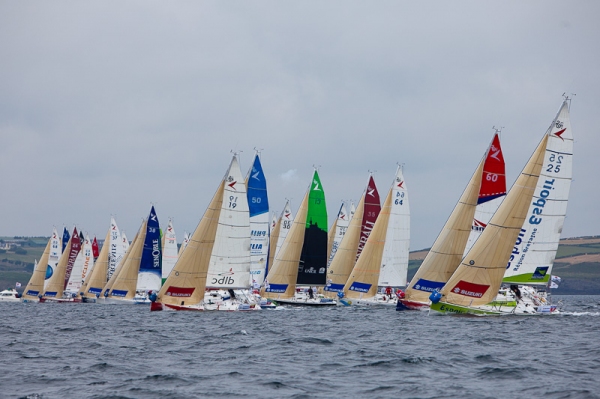
The Figaro fleet depart Kinsale in August. Photo: Bob Bateman
Preparing for La Solitaire du Figaro here
Latest news for La Solitaire du Figaro here


























